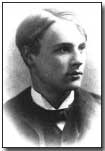Who's Who - Lord Northcliffe
 Alfred Charles William Harmsworth,
later Alfred Lord Northcliffe (1865-1922) was a British newspaper pioneer
who revolutionised magazine and newspaper publishing in Britain in the early
years of the twentieth century, and who wielded significant political power
through the medium of his popular dailies.
Alfred Charles William Harmsworth,
later Alfred Lord Northcliffe (1865-1922) was a British newspaper pioneer
who revolutionised magazine and newspaper publishing in Britain in the early
years of the twentieth century, and who wielded significant political power
through the medium of his popular dailies.
Born in Ireland, Harmsworth started his remarkable career as a freelance journalist having left school at 16 for that purpose. He became a regular contributor to the popular periodicals of the day.
Having seen the manner and method by which such magazines were published in the U.S. Harmsworth was convinced he could transform the British market with a new magazine publication of his own. Thus in 1888 he founded - with brother Harold (later Viscount Rothermere) as his financial administrator - Answers to Correspondents.
In the space of just five years the brothers increased the circulation of their weekly magazine to in excess of a million copies. Harmsworth founded and bought out other magazine periodicals and, over time, constructed the world's largest magazine publishing house, the suitably named Amalgamated Press.
Deciding to branch out into newspaper publishing, in 1894 he bought the London Evening News. Within the realm of newspaper publishing Harmsworth worked to introduce numerous popular features hitherto unseen in the daily press, including book serialisations, social gossip and women's columns.
He founded the Daily Mirror in 1903 (seven years after similarly founding the bestselling Daily Mail) as a women's newspaper, but was forced to backtrack after initial sales proved disastrous. Transforming it instead into a popular daily for both men and women the usual Harmsworth pattern emerged: it rapidly established itself as a huge-selling daily newspaper.
In 1904, having previously turned down the offer of a knighthood, Harmsworth was made a baronet, as he himself requested. The following year he became the youngest peer of the realm to date as he took the title Lord Northcliffe.
Having bought the fading Times in 1908 Northcliffe reinvigorated it, galvanising its sales in the process. He retained ownership of this most prestigious of newspapers (which he was aware carried enormous political clout) until his death, when it was sold on to John Jacob Astor.
Early in the First World War Northcliffe embarked on a campaign target primarily against Lord Kitchener but which also encompassed the Prime Minister Herbert Asquith. The campaign against Kitchener was ostensibly directed at the perceived munitions shortage on the Western Front overseen by Kitchener (and disastrously highlighted by the then Commander in Chief, Sir John French, and which helped to lose him his job).
However Kitchener (of Khartoum) was a long-established national hero and sales plummeted overnight, with over a million lost sales.
Nevertheless Northcliffe's publicly expressed views on Kitchener's shortcomings were privately shared by many in the cabinet. Kitchener's death at sea in June 1916 was openly welcomed by Harmsworth as aiding the war effort ("the British Empire has just had the greatest stroke of luck in its history").
Later that year Asquith was himself effectively hounded from office (as had the First Sea Lord Prince Louis of Battenberg in October 1914); in his place emerged David Lloyd George, who received key support from Harmsworth's newspapers.
Viewing Northcliffe as a loose cannon - and by no means returning Harmsworth's liking of him - Lloyd George attempted to bring the former into the cabinet by offering him control of the air ministry, a pet interest of Northcliffe's (who had long championed scientific and technical innovations).
Northcliffe however recognised that this would restrict his ability to criticise the government, and so declined the post.
Made a viscount in 1917, Lloyd George finally convinced Northcliffe that he could play an effective role in government, with the latter accepting an appointment as Director of Propaganda - a position to which he was ideally suited. He quickly arranged for some four million leaflets to be dropped by air into enemy territories.
Having resigned from the government on Armistice day, and finding himself excluded from the Versailles peace settlement - much to his annoyance - Northcliffe led calls (as ever, through his newspapers) for a punitive settlement upon Germany.
In return for offering support for Lloyd George's coalition government in the 1918 general election, Northcliffe required that the former accept a list of the names of people who should feature in his government. Lloyd George refused; even without Northcliffe's support Lloyd George won the election handily.
His health rapidly deteriorating from 1921, Northcliffe suffering from Streptococcus, an infection of the bloodstream. He died the following year in August 1922. Characteristically, he stipulated in his will that all of his six thousand employees were to be granted the equivalent of three months additional salary as a bonus; which amounted to £533,000.
Click here to read Lord Northcliffe's account of the early stages of the Battle of Verdun.
"Devil Dogs" was the nickname given to the U.S. Marines by the German Army.
- Did you know?
